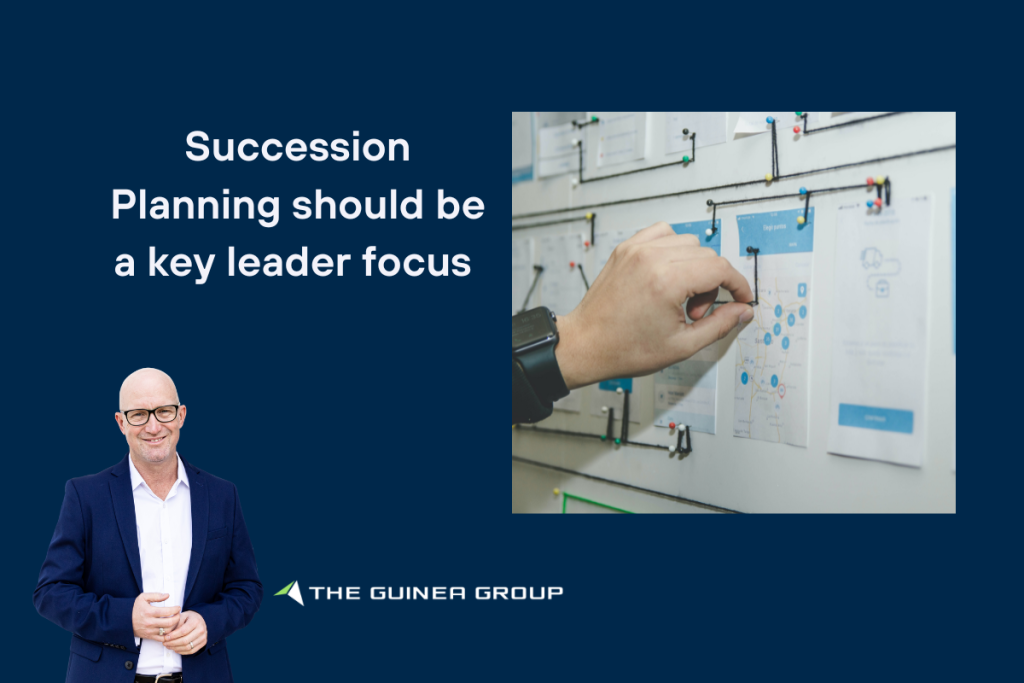Anton Guinea
Entrepreneur, Speaker, bestselling author, and founder of The Guinea Group of Companies. For over 15 years, Anton has helped leaders move their teams to become psychologically safe, physically safe and overall better versions of themselves.

Succession Planning should be a key leader focus

The year was 1998, and I was lucky enough at the time to have gotten my first job as a Maintenance Planner at Santos Limited. I was only employed by Santos for about two years, but I learnt so much during that time, from some great leaders.
One of the things that I learnt about was succession planning.
I can remember being in my leader’s role for a period of time. On his return, we had a conversation about my career progression, and his. He shared that part of his career progression was preparing someone to fill his role. My leader explained that Santos had a rule (back then at least) that ‘they didn’t promote anyone into more senior roles if they hadn’t developed someone to fill their role’. In other words, don’t put in for a promotion if you haven’t done succession planning.
Contrary to popular belief, succession planning is not limited to executive roles alone; it encompasses all levels within the organisation. By providing employees with clear pathways for growth and development, companies foster a sense of loyalty and commitment, reducing turnover rates and ensuring the retention of top talent.
As we navigate an ever-evolving business landscape, the importance of succession planning cannot be overstated. It empowers organisations to thrive in an environment of constant change, secures a sustainable future, and lays the groundwork for continued success!
Let’s unpack some of the key elements of succession planning.
1. Identification
Succession planning involves identifying high-potential employees within an organisation and nurturing their skills, knowledge, and competencies to prepare them for future leadership roles.
By proactively investing in the development of individuals, companies create a talent pipeline that aligns with their strategic objectives. This approach not only reduces the risk of leadership gaps but also fosters a culture of growth and employee engagement, which ultimately drives organisational performance.
2. Risk Mitigation
Succession planning is crucial for mitigating risks associated with unexpected departures, retirements, or sudden leadership vacancies. By identifying and grooming potential successors in advance, organisations can ensure a smooth transition without compromising productivity or stability.
Proactive planning minimises the potential disruption that can occur during leadership changes, allowing businesses to maintain their momentum and operational efficiency.
3. Future Proofing
Effective succession planning promotes a culture of innovation and adaptability. By grooming individuals for leadership roles, organisations create a pool of diverse talent that brings fresh perspectives and ideas to the table.
These emerging leaders, having been groomed within the organisation’s specific context, are well-versed in its values, goals, and strategies. As a result, they are better positioned to drive innovation, adapt to changing market conditions, and guide the company through the challenges of the future.
I encourage you to reflect on your organisation’s succession planning strategies and how they align with your long-term goals. By investing in the development of future leaders and embracing a proactive approach to talent management, we can shape a brighter future for ourselves and our organisations.
And please click the image below if you’d like to chat about what leadership means to you.
If you would like to learn more about Anton or The Guinea Group, please click here to book into Anton’s calendar, to:
UPGRADE your Mindset
UPSKILL your Leadership
UPLIFT your Teams
About Anton
Anton has dedicated his working life to helping leaders to upgrade their mindset, upskill their leadership, and uplift their teams! With a focus on helps leaders to better lead under pressure. Anton is an entrepreneur, speaker, consultant, bestselling author and founder of The Guinea Group. Over the past 19 years, Anton has worked with over 175+ global organisations, he has inspired workplace leadership, safety, and cultural change. He’s achieved this by combining his corporate expertise, education (Bachelor of HR and Psychology), and infectious energy levels.
Work With Anton!
Subscribe to our Newsletter
